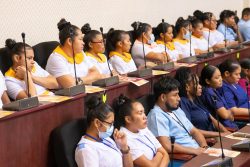Quite apart from the human dimensions of what happened at Mahdia, the tragedy brought home with a vengeance structural problems in relation to the regional system of governance in this country. There has already been comment on officialdom’s propensity for commissioning reports which are left to moulder on shelves and whose recommendations are never followed up. In the case of Mahdia, those reports related in the first instance to inspections by the Fire Service, which even if poorly equipped was certainly fulfilling its duties on the fire prevention front, and in the second, to a report commissioned by the Ministry of Education funded by UNICEF on all 24 dormitories across Guyana.
In addition to a review of the physical plant this report contained data obtained from interviews with administrators, educators, students and other stakeholders. “All the school dormitories,” it stated, “have systematic and similar issues related to management system inadequacies, lack of resources and inadequate functional spaces, major shortage of staff and behavioural issues with students.” Following the fire the government made no mention of this report, even although the Fire Service had made citizens aware of its own inspections of the dormitory and the fact it had passed copies of its reviews and recommendations to the relevant authorities.
Although initially the Ministry of Education came in for flak in relation to the fact that nothing had been done following the report by the Fire Service, Minister Priya Manickchand quickly clarified that her ministry was not privy to the recommendations in the report. All out-of-town schools, it was explained, came under the Ministry of Local Government and Regional Development with the intention of decentralizing services and giving regional governments oversight responsibility. The Ministry of Education, she said, could make recommendations for improvements, but any budgetary allocations would be made to the account of the Ministry of Local Government.
So what did the Local Government Ministry know about the reports? That is a question still to be answered since the responsible Ministers – Nigel Dharamlall and Anand Persaud ‒ have had nothing to say on the matter. Any information they had about the fire report would have come via the Regional Executive Officer, who is appointed by the government and not by the regional authorities. Minister of Home Affairs Robeson Benn under which the Fire Service falls, would not have received it, we were told, since following up on such reports falls within the remit of the heads of agencies.
The Guyanese system of governance is a complicated one and at a local level authority is supposedly devolved to elected Regional Democratic Councils which are responsible for education, health and agricultural support in the regions; as well as to municipalities, Neighbourhood Democratic Councils and Amerindian Village Councils. In the case of the Fire Service report, the responsible official for its receipt was the Regional Education Officer for Region Eight to whom it was forwarded via the RDC.
That said, it appears that the Councillors on the RDC knew nothing about it. Regional Chairman Headley Pio admitted to this newspaper that the matter had never been brought to council, although he could not say why. This was confirmed by APNU Councillor Hyacinth Joseph, who said the inspector’s report was never tabled, nor the Councillors apprised of its contents. She went on to say that since the opposition did not sit on any of the regional council sub-committees, they did not know what was discussed there until a matter was brought up in council. One must presume that the fire report did not come up in a sub-committee either.
Chairman Pio referred all further questions to Mr Peter Ramotar, the REO. Our reporter described him as becoming “agitated” when asked about the actions which had been taken after the Fire Service handed over its recommendations. “Why are you asking all of these questions now,” he was quoted as responding, “do you have such systems in your office?”
He later said, “I don’t know what you would determine as adequate, but no, we don’t have sprinkler systems and alarms or fire buckets but there are some fire extinguishers.” It might be noted that the matter of the fire extinguishers is still an open question.
It was not just the dormitory which was inspected by the GFS, but all the government buildings in the township. None of the recommendations in relation to any of those structures have been implemented either, in addition to which this newspaper was told that the fire station had made recommendations for resources to aid them in their duties. It was not said to whom these particular requests were submitted, and whether it was the RDC or Home Affairs, although it was understood the GFS was still waiting for them to be processed.
A major reason for this lack of accountability is the fact that the regional officials are not fully masters of their own domains. Never mind the elected RDCs, the official with the power is the REO, who is appointed by, and is answerable to the government. In regions such as Four, where the opposition is strong, the arrangement has caused considerable friction, since the REO there has been accused of bypassing the decisions of the elected councillors.
Whenever this happens, it undermines the whole concept of devolution and the holding of regional officials responsible for their own decisions. It becomes just a more convoluted version of centralisation and leads to inertia since all the officials will wait for the REO to act, or instruct on the direction action should take. It is not a formula for efficiency, not to mention the fact that if an executive official can override a council decision, then automatically democratic processes will be eroded.
And what applies to the Fire Service recommendations, also applies to what for brevity’s sake can be called the UNESCO report. The distribution of responsibilities is even more complicated in the case of this more comprehensive report, since in the instance of dorm parents, for example, their appointments are the province of the Public Service Ministry. However, this is facilitated by the REOs through their Regional Education Officers.
The question is being asked as to why the authorities which were in receipt of the report took no further action such as filling the vacancies of dorm parents and holding workshops, etc. But this brings us back to the REOs again. A source told Stabroek News, “The REdOs [Regional Education Officers] make recommendations but the REOs don’t follow through… the Regions are not taking these issues seriously and getting the Ministry of Finance to see the importance.”
It has to be said that owing to the challenge of getting the regions to implement the recommendations in the report, the Ministry of Education sought funding for the purpose of upgrading five dormitories from its capital budget. It might be remarked, however, that those five did not include Mahdia. That the government was embarrassed by the report is evident from the fact that they never disclosed it, even after the Mahdia fire. It had been completed a year prior to this, and it was this newspaper which made it public on June 5th.
As for Minister Manickchand, she is declining to specify precisely who was provided with the report; all she will say is that it was sent to the “relevant parties”, and these would be disclosed in the context of the Commission of Inquiry. When asked whether she had shared what was essentially a damming report with her Cabinet colleagues, she simply repeated what she had said earlier. Her reticence suggests there is enough liability to go around.








